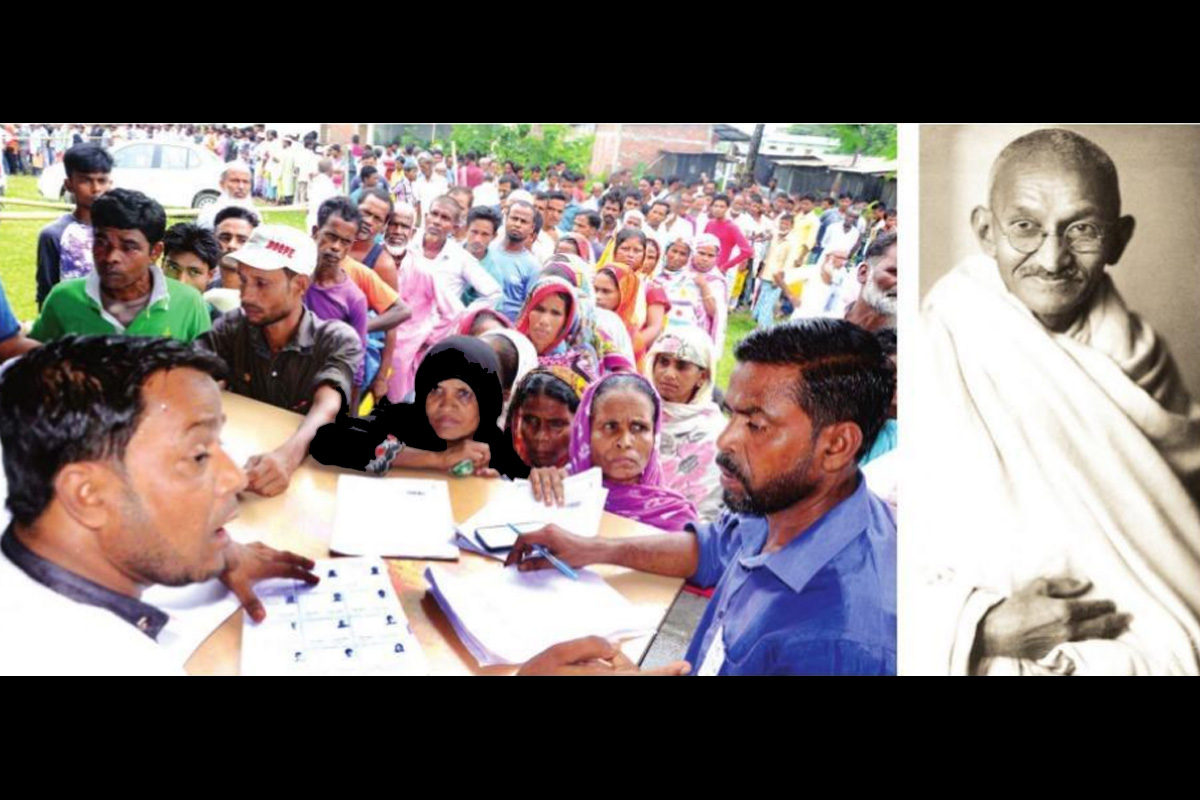Mahatma Gandhi’s evocative call to Angami Zapu Phizo to remain free from any subjugation, and his wish to disband the Congress party after Independence, signified his foresight and futurist unburdening of statist structures in independent India. In a positive sense, a light and non-interfering state machinery, which would allow people to shape their own institutions of self governance, based on creative responses to their social, economic and cultural “needs”, was part of Gandhi’s future vision of India.
Assuming that we arrived at such a people-centric decision, would that state require rigid procedures of identification of its citizens only in order to bar non-citizens and immigrants from their share of its resources and other rights and entitlements? Gandhi’s moral pointer of not permitting individualised and private ownership over natural, social and public resources kept entitlements over them open to collective labour-based trusteeship that included both oneself and another. So, drawing lines of differentiation between what is “mine” from “others”, who are foreign or alien, weren’t pronounced in Gandhi’s thoughts and vision. Further, the lived space with shared resources allowed for a certain level of accommodation, as one had to necessarily depend on others’ contributions to society and economy in order to even build self-reliance in a mutual give and take.
Gandhi’s notion of “my” in my country, as opposed to the foreigner and even the immediate neighbour, was never closed within pre-existing historically settled and territorially bound nation states. Rather “Hind Swaraj” was critical of state as a system of rule that frittered away community resources and sacrificed the very liberty and freedom of its essential constituents — the people.
This part of Gandhi’s apparent subscription to Irish revolutionaries and other Left liberals was mediated by an idea of sacrifice, which in turn was driven by an inner sense of purity and truth through satyagraha. “Swaraj”, as the goal or direction towards which the state should go, neutralised any overwhelming idea of determination of limits of rights, entitlements and authority of the members of the people.
Given this, the call for deportation of foreigners, en masse, or denial of citizenship to any section of people in the name of a community or any social identity was a total no go for Gandhi. He advocated a jurisprudence of accommodation and acceptance of the foreigner, of the so-called illegal immigrants and people not belonging to dominant races considered the main inhabitants of a country, when he defended quite a few of them in courts in the United Kingdom and South Africa. Gandhi’s legal stance was the exploration of middle grounds of law that drew a compromise between markers of being a citizen and their extension to “others”, if those people did not commit direct harm to the social fabric in a foreign country. This is a principle of accommodation and non-refoulment to formal and informal, recorded or unrecorded asylum seekers, whom he looked at as part of common humanity and hence, fit to belong to any other nation than just their own.
The critical question is, can a nation-state exercise its legal authority to exclude and reject equal claims to citizenship in a foreign country, a country other than their last origin? Gandhi would not grant the nation state such a right to reject claims of others to be citizens in that country, especially in circumstances in which one is displaced and forced to seek shelter or asylum in another country in the interest of saving life, limb and liberty. In other words, victims of humanitarian crises are not be necessarily turned back or treated as illegal aliens.
In this context, the case of illegal immigrants who cross the border to settle in another country for the allurement of a better life falls within the state’s self-restraint on treating them as aliens, or rather, not treating them as lowly subjects under its laws that can deny them right to equality and dignity. Gandhi’s advocacy for African Americans and other nonwhite races including Indian people in South Africa reflected this advocacy for the state not to discriminate between a native and a foreigner in a manner that the latter cannot have a sense of equality and dignity.
The larger question here is, whether there could be specific laws barring equal rights to foreigners or eliminate them from active considerations? Gandhi certainly would consider such laws as discriminatory to the core and an abuse of inherent humanity that does not allow for such rigid differentiation and boundary-making. He would then consider standing up for those who are discriminated against and hence, not qualified to enjoy “equal citizenship”, as a moral duty of a satyagrahi and would seek redemption including redress in courts of law.
Towards this, Gandhi would specifically stand up against legal formulations that draw a line between the native and foreigner, and would argue against laws that debar an immigrant from inclusion in other’s shores. His reflections on laws in Transvaal that wanted to keep Indians out indicate that legally sanctioned discrimination between the native and non-native settlers on the basis of colour was unacceptable to him. These views were expressed by him in no uncertain terms through his writings in Indian Opinion. One might say that a nativist or colonist framework of law, for Gandhi, lacked the essential human sense of respect for others. The National Register of Citizens encourages disrespect towards others as a naturally driven response for self-preservation, which in a Gandhian way, undermines the essential humanity of others.
This could also be seen in several of Gandhi’s responses to various Indian communities and their leaders who were worried about outsiders arriving and taking over their land and resources. In a letter to Gopinath Bordoloi, who is considered the architect of a pro-Asomiya state policy, Gandhi reminded him that Assam is not only for the Assamese, as it must embrace others who come to it for reasons of distress and despair. A similar response was found in Gandhi’s advice to Frontier Gandhi who, inspired by the Mahatma, advocated a Pathan-Pashthun peaceful coexistence without dividing Western Punjab for Punjabis, Pathans and Pashtuns.
Much of today’s NRC could be seen as a repetition and re-enactment of unresolved ethnic, religious and linguistic divides created by enforced territorial divisions during colonial times. Instead of being a national register to be drawn from citizens, the NRC exercise largely became an attempt to declare who is a non-citizen, or worse, a conflation between the two. Gandhi’s non-discriminatory approach would not allow for a separation of the illegal immigrants and legal immigrants, natives and immigrants.
Such categories of differentiation and their perpetuation, for Gandhi, militate against the very condition of peaceful co-existence and tolerance for differences within one’s own lived space. The legal logic of categorisation bordering on implicit and explicit conflictual differentiation is something that Gandhi would disapprove as shockingly inhuman. Gandhi’s indignation for Nazi ideology of antiSemitism or casteist superiority provides the cue for considering everyone as affiliated to an Indian identity that establishes the much needed spirit of nondiscrimination between various segments of Indians.
This spirit is reflected in the very definition of who is an Indian citizen by the Constitution that recognises those as Indians whose forefathers originate from undivided India. The NRC’s discrimination between Indians and Indians removes this sentient meaning of being an Indian originating from undivided India.
The writer is a political analyst and philosopher.











